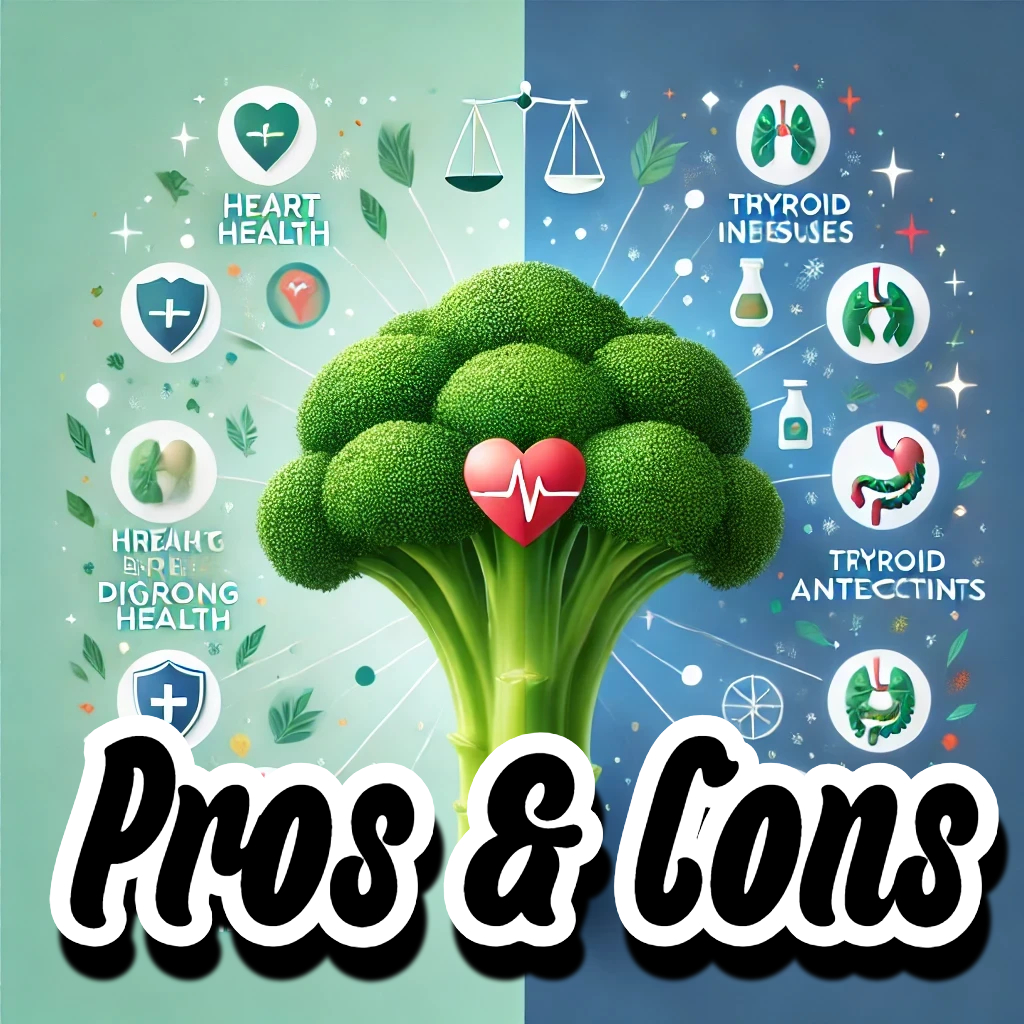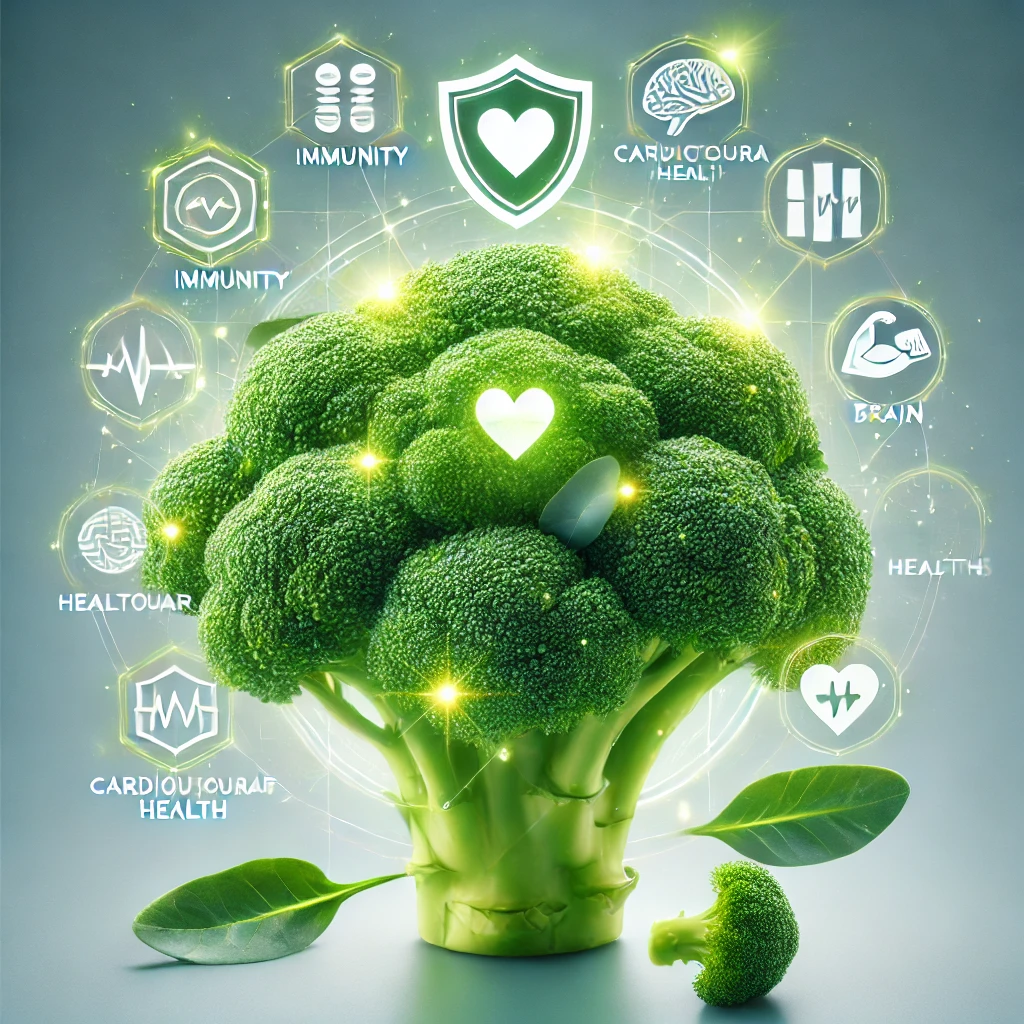Broccoli, a verdant vegetable that has graced tables for centuries, stands as one of the most celebrated members of the cruciferous family. Lauded for its nutritional density and multifaceted health advantages, it’s no wonder this green delight earns its place among the ranks of “superfoods.” However, like many things in life, broccoli has its fair share of downsides. Let’s delve deep into the virtues and shortcomings of this beloved vegetable, analyzing whether its superfood status is truly deserved.
Pros of Broccoli: The Green Giant of Nutrition
- Nutrient-Rich Composition Broccoli boasts a near-unmatched nutrient profile. Packed to the brim with vitamins, minerals, and antioxidants, it offers a cornucopia of health benefits. A single cup of broccoli provides a hefty dose of vitamins C and K, critical for immune health and blood clotting, respectively. Additionally, this powerhouse delivers fiber, potassium, and folate, making it a prime candidate for a nutrient-dense diet.
- Antioxidant Powerhouse The antioxidants present in broccoli, particularly sulforaphane, set it apart as a potent fighter against oxidative stress. Sulforaphane, a sulfur-containing compound, has been studied extensively for its ability to neutralize free radicals and reduce the risk of chronic diseases, such as cancer and heart disease. Regular consumption of broccoli may, therefore, act as a protective shield for your cells, warding off damage from harmful agents.
- Heart Health Broccoli’s benefits extend to cardiovascular well-being. Its high fiber content helps in maintaining healthy cholesterol levels, reducing the risk of heart disease. Furthermore, the potassium present in broccoli plays a pivotal role in regulating blood pressure, promoting overall heart health. With these attributes, broccoli becomes a key player in keeping your ticker in optimal condition.
- Gut Health and Digestion Fiber is a critical element in supporting digestion, and broccoli is replete with it. This cruciferous vegetable can aid in preventing constipation, promoting regular bowel movements, and fostering a healthy gut microbiome. The fiber content in broccoli also promotes satiety, making it an excellent choice for those looking to maintain a healthy weight.
- Bone Health Support With impressive levels of vitamin K and calcium, broccoli is an ally for bone health. Vitamin K enhances calcium absorption and plays a significant role in bone density, helping to reduce the risk of fractures and osteoporosis. For those mindful of skeletal health, broccoli can be an essential component of the diet.
- Anti-Inflammatory Properties Broccoli is known for its anti-inflammatory effects due to bioactive compounds like kaempferol. Chronic inflammation is a precursor to a range of illnesses, from arthritis to heart disease. Including broccoli in your diet may help mitigate inflammatory responses and lower the risk of related health issues.
Cons of Broccoli: The Hidden Side
- Digestive Discomfort Despite its numerous benefits, broccoli can cause gastrointestinal issues for some individuals. Its high fiber content, while beneficial in many ways, can also lead to bloating, gas, and indigestion. The fermentable oligosaccharides, disaccharides, monosaccharides, and polyols (FODMAPs) found in broccoli may trigger discomfort, especially in individuals with irritable bowel syndrome (IBS) or sensitive digestive systems.
- Potential Thyroid Interference Broccoli, like other cruciferous vegetables, contains goitrogens—substances that can interfere with thyroid function by inhibiting iodine uptake. For individuals with thyroid disorders, particularly those who are iodine deficient, consuming large quantities of raw broccoli could potentially exacerbate the condition. However, cooking broccoli significantly reduces its goitrogenic properties, making it safer for those with thyroid concerns.
- Pesticide Residue Conventionally grown broccoli, like many non-organic crops, may carry pesticide residues. These chemicals can accumulate in the body over time, posing potential health risks. While washing and peeling can reduce pesticide exposure, choosing organic broccoli when possible may be a safer option, particularly for those concerned about long-term pesticide exposure.
- Allergenic Potential Though rare, some individuals may be allergic to broccoli. Symptoms of a broccoli allergy can range from mild, such as itching or swelling, to more severe reactions like anaphylaxis. If you have a history of food allergies, it’s wise to approach broccoli consumption with caution and monitor for any adverse reactions.
- Interference with Blood Thinners Broccoli’s high vitamin K content, which is beneficial for bone health and blood clotting, can also pose challenges for individuals on blood-thinning medications, such as warfarin. Since vitamin K plays a crucial role in the clotting process, consuming excessive amounts of broccoli can interfere with the effectiveness of these medications. People on anticoagulants should moderate their intake and consult with their healthcare provider.
- Preparation Matters While raw broccoli retains most of its nutrients, some cooking methods can significantly reduce its health benefits. Boiling broccoli, for instance, can leach water-soluble vitamins like vitamin C into the cooking water, diminishing its nutritional value. Steaming or lightly sautéing broccoli is generally considered the best way to preserve its nutritional integrity while improving its digestibility.

In Conclusion: Should Broccoli Stay on Your Plate?
Broccoli’s place in the pantheon of superfoods is well-deserved, thanks to its rich nutritional profile and myriad health benefits. From supporting heart health and digestion to fortifying bones and reducing inflammation, this green gem certainly earns its accolades. However, it’s important to acknowledge the potential downsides, including digestive discomfort, thyroid interference, and the impact of pesticides.
For the vast majority of individuals, the benefits of broccoli far outweigh the cons, especially when consumed in moderation and prepared appropriately. Whether you’re seeking a nutrient-dense vegetable to enhance your diet or simply aiming to diversify your meals, broccoli remains a stellar option. Just remember, balance and variety are key to a healthy diet—broccoli is but one piece of the larger nutritional puzzle.


